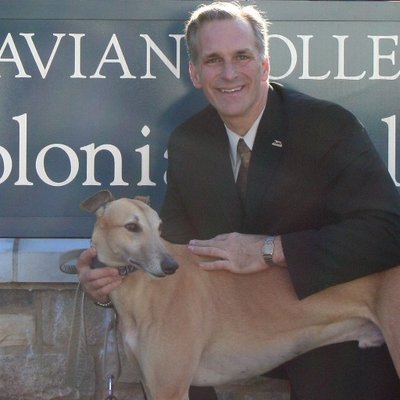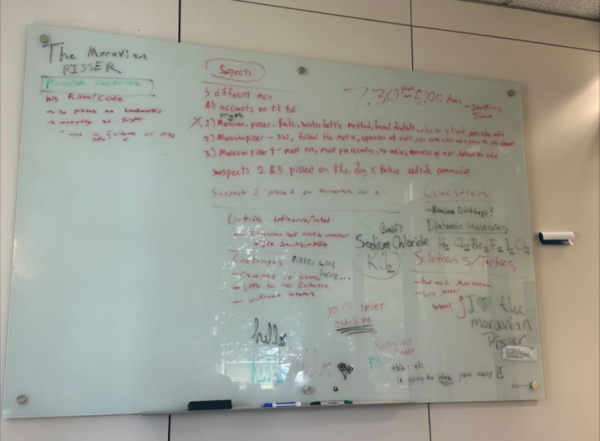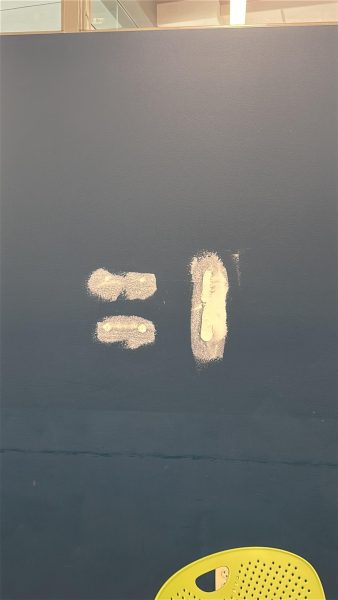Our Sit-Down with President Grigsby, Part III: MoCo’s University Status & Wrapping Things Up

Photo courtesy of President Bryon Grigsby
After our two previous segments, we’ve finally reached the concluding parts of our sit-down interview with President Grigsby. In concluding our interview, we asked President Grigsby about Moravian’s fast-approaching switch to university status, COVID’s effect on the College and virtual learning, and his final thoughts for the campus and our readers.
Thank you to President Grigsby, as well as our readers as we worked our way through this three part series!
President Grigsby’s responses have been edited for length and clarity.
Why does Moravian want to change its status from college to university?
One thing is, we have multiple doctorate degree [programs], which colleges like us don’t offer. Lafayette, Dickenson, and Gettysburg don’t even have master’s degrees. [But] we have 25 master’s degrees and three doctoral degrees coming online, so that is more of a university structure. It helps graduate students, because it’s kind of weird for them to say “Moravian College” when someone asks them, “Where did you get your doctorate?” You get a doctorate from a university.
I’m used to my alma mater being called Moravian College, but it will just be better as Moravian University because nothing’s really changing for the undergraduates. We’re not going to jump up to become a massive, big university like Penn State. We’ll be more like Elon University, Quinnipiac and the University of RedLands — schools that still have smaller undergraduate populations, with small classrooms and dedicated faculty. That’s not changing. What is changing is the university structure of the graduate programs.
What are the benefits?
[Being a university] helps faculty who are doing research and garnering grants, because in general universities are seen as having more resources, more students, more faculty, and generally bigger budgets. So, we’d be able to handle larger grants than we were able to get before.
[Another reason] relates to our international students, [who] will tell you that college to them means high school. In their countries, higher ed is called a university. So it’s always a confusing thing [for us] to say to [prospective students from abroad], “Well, why don’t you come to the United States to this college?”
And, in general, for students graduating from Moravian, even as undergraduates, a degree from a university is seen as being much stronger than a degree from a college. So, it will help them with job prospects as they go out into the workforce or on to graduate school.
Besides the fallout from COVID, what are the biggest challenges you see Moravian facing in the next decade? What are your plans to address those challenges?
Declining enrollments and shrinking demographics.
You know, Moravian finds itself in a wonderful city that the Moravians founded in 1741, so that offsets a lot of the problems that other colleges in much more rural communities are facing. The challenge is that there are probably going to be fewer and fewer students who are interested in coming to college and having a residential experience. They may stay at home and commute to school, because they want to stay with their families and that’s part of their culture. That’s fine, that works out well for Moravian being in Bethlehem. We have already seen growth in our commuter populations as we seek to better serve that group. We’re going to have to make lots of those kinds of changes. As our demographics change, our systems and our structures have to change as well.
When I went to school at Moravian [1986-1990], [there] were 1,200 students and we all lived on campus. Now we’re pushing towards 2,000 students, and 40% of them, both our graduate and undergraduate, commute. So, how we continue to serve those students is going to be the challenge.
I also think over the next five to eight years you’re going to see significant campus closures, which is going to drive more students to Moravian because there are going to be fewer providers. We’ve already seen about eight campuses close this year because of COVID, so those students now have to go find other places [to continue their education].
As long as we keep building graduate and undergraduate programs that meet the needs of society, such as our nursing program, sports medicine rehab, mental health and wellness, clinical counseling programs, [etc.], we [can] stay focused on helping students get from here to graduate schools, so they can get their dream careers.
As long as we keep focusing on that, I think we’ll be fine. But we’re going to have to build new programs to meet those needs as those needs become apparent. For example, if you look at mental health, that’s probably the greatest need coming at us and we’re just starting to build that with our partners at St. Luke’s. We need to remain current is the main thing. Current in our city and current in our offerings.
Now that students and faculty are more knowledgeable about and maybe more comfortable in the online environment, do you think Moravian will offer more online course options in the future?
I think what we need to figure out is how to do blended learning really well. We’re working on this right now. What faculty need is to be able to see all the students who are online in the Zoom box, so how do we get big screen TVs facing the faculty, so that if Sam is online, she can raise her hand and the faculty member can see her in the same way the faculty member can see the students in the classroom? That’s the challenge because then you can have a really effective blended learning in a synchronous way.
I think we’ll be offering more online and asynchronous [courses] as well, but I’d really like to think about how we can merge the two into a really good, blended format where some people are online but it’s synchronous with the faculty members and their class and others are in class at Moravian. So, it’s not going away. Unfortunately, I think snow days are officially gone away because we are now comfortable in this environment, so we should use it to the best advantage we can.
Do you have any final thoughts or words you’d like to leave with our readers or the campus at large?
I am so proud of this campus. The media isn’t beating down our doors to see how well you have done all through last semester and continuing into this semester, but they should be. They pick on the schools that aren’t doing well, but they’re not picking on all the schools like us who are doing well. And it’s not a huge number [of cases]. I think if you look at it it’s a small number [of cases]. But we could change all the food, put up barriers, put out hand sanitizers, but if you guys hadn’t changed your behavior we wouldn’t have succeeded.
We really relied on all the students to modify their behavior, so that we could provide the best education possible. And you all did it! I gush when I talk to other college presidents about my campus and my students when they’re berating theirs. You guys proved them all wrong that you couldn’t do it.






